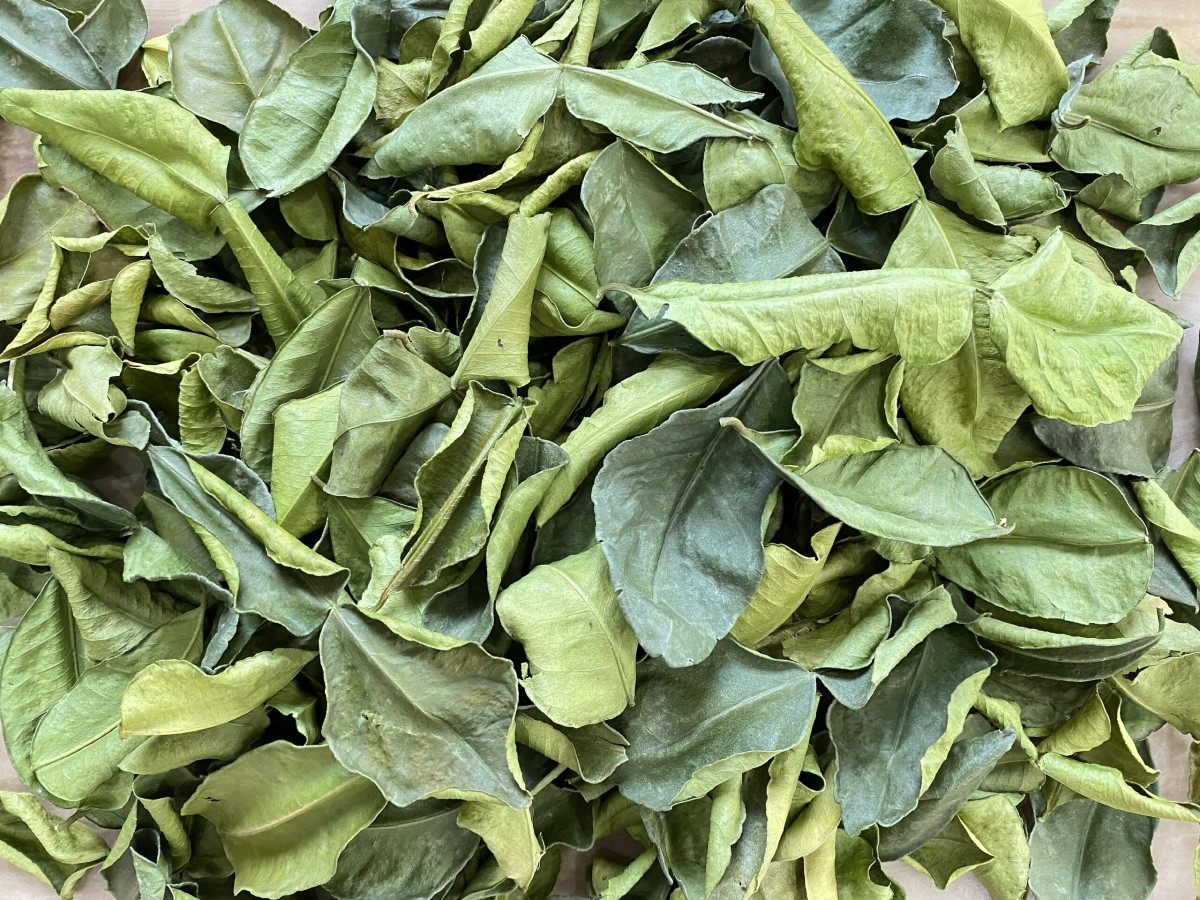Not only does it enhance the flavor of the dish, this is the use of lemon leaves.
Lemon leaves are known as an indispensable spice in some dishes. In addition, this leaf is also known in traditional medicine. Here are all the uses of lemon leaves in preventing and treating some common diseases.
Overview of lemon leaves
Lemongrass leaves have a pleasant aroma and add a distinctive flavor to many dishes. They are commonly used in soups, curries, stir-fries, and some drinks and desserts. They are available fresh or dried, but the fresh leaves tend to have a stronger flavor.
In addition, lemon leaves are also widely used in traditional medicine. Because lemon leaves contain many antioxidants, have anti-inflammatory effects, prevent chronic diseases, protect digestive health, manage diabetes...

Health benefits of lemon leaves
Lemon leaves contain antioxidant properties.
Lemon leaves are rich in antioxidants, which may help protect your body from free radicals and oxidative stress through several mechanisms:
Natural compounds
Lemon leaves contain many natural compounds with antioxidant properties, such as flavonoids, phenolic acids, and terpenoids. These compounds help neutralize free radicals by donating electrons, which stabilizes the free radicals and prevents them from causing further cell damage.
Synergistic effect
The various antioxidant compounds found in lemongrass may work synergistically, enhancing their overall effectiveness in neutralizing free radicals. This synergy allows lemongrass to provide more comprehensive protection against oxidative stress.

Reduce inflammation
The antioxidant properties of lemon leaves, combined with their anti-inflammatory effects help reduce inflammation in the body, relieving symptoms associated with various inflammatory conditions and supporting overall health.
Prevent chronic diseases
Oxidative stress is linked to the development of many chronic diseases, such as cardiovascular disease, diabetes, and neurodegenerative diseases like Alzheimer's disease. By neutralizing free radicals and reducing oxidative stress, the antioxidants in lemongrass may help reduce the risk of developing these conditions.
Lemon leaves have anti-inflammatory effects.
Lemon leaves may help reduce inflammation through several mechanisms, potentially benefiting people dealing with such conditions:
Lemon leaves contain many natural compounds.
Lemon leaves contain compounds, such as flavonoids and other phytochemicals, that have been shown to have anti-inflammatory properties in laboratory studies. These compounds may help inhibit the production of inflammatory chemicals, such as prostaglandins and cytokines, and block the activity of enzymes involved in the inflammatory response, such as cyclooxygenase and lipoxygenase.
Antioxidant properties
As mentioned, lemon leaves are rich in antioxidants, which can help neutralize free radicals and reduce oxidative stress.
Oxidative stress and inflammation are closely linked, with one often exacerbating the other. By reducing oxidative stress, the antioxidants in lemongrass may help reduce inflammation and support overall health.
Uses of lemon leaves in specific diseases
Lemon leaves help treat arthritis
Arthritis, such as rheumatoid arthritis, involves chronic inflammation of the joints that can lead to pain, stiffness, and reduced mobility. By helping to reduce inflammation, lemongrass may help alleviate some of these symptoms and improve overall joint function.
Asthma
Asthma is a respiratory condition characterized by inflammation and constriction of the airways, leading to difficulty breathing, wheezing, and coughing. The anti-inflammatory properties of lemongrass may help reduce airway inflammation and provide relief for people with asthma.

Lemon leaves improve digestive health
Production of digestive enzymes
Lemon leaves contain compounds that can stimulate the production of digestive enzymes in the body. These enzymes help break down food, making it easier for the body to absorb nutrients. By promoting the production of these enzymes, lemon leaves can aid in efficient digestion and nutrient absorption.
Reduces bloating and flatulence
Flatulence is the result of fermentation of undigested food in the intestines, causing discomfort and pain.
Lemon leaves have carminative properties, which means they can help relieve gas and bloating by promoting gas expulsion and improving overall bowel function.
Support intestinal health
A balanced gut microbiome is essential for overall digestive health, as it aids in the breakdown of food, vitamin synthesis, and immune system support. Lemongrass also has antibacterial properties that can help maintain a healthy balance of gut bacteria.
Lemon leaves help boost immunity
Lemon leaves may contribute to enhanced immune function through several mechanisms.
Antioxidant properties
Lemon leaves are rich in antioxidants such as flavonoids, phenolic acids, and terpenoids. These compounds may help protect the immune system by neutralizing free radicals and reducing oxidative stress, which can weaken immune function and make the body more susceptible to infection.
Antibacterial activity
Lemon leaves contain compounds with antibacterial properties that can help inhibit the growth of many types of bacteria, viruses, and fungi. This antibacterial activity can help the immune system fight harmful pathogens, helping to prevent or reduce the severity of infections.
Vitamin C content
Lemon leaves also contain small amounts of vitamin C, a nutrient essential for immune function. Vitamin C aids in the production and function of white blood cells, which play an important role in protecting the body against infection. It also acts as an antioxidant to protect the immune system against damage from free radicals.

Lemon leaves help reduce stress
The scent of lemongrass helps reduce stress and promote relaxation. Inhaling the scent of lemongrass can help stimulate the olfactory system, which is directly connected to the brain's limbic system. The scent of lemongrass can help trigger the release of feel-good chemicals like serotonin and endorphins, which can reduce stress and anxiety levels.
Lemon leaves help protect oral health
Lemon leaves can contribute to improved oral health and help reduce bad breath through its antibacterial properties.
Lemon leaves contain compounds with antibacterial properties, which can help inhibit the growth of bacteria and other microorganisms in the mouth. By reducing the number of harmful bacteria, lemon leaves can help prevent plaque buildup, tooth decay, and gum disease.
You can chew fresh lemongrass leaves or use them as a mouthwash which can help mask bad breath and leave your mouth feeling fresh and clean.
Additionally, chewing lemon leaves can stimulate saliva production, which is essential for maintaining a healthy oral environment. Saliva helps wash away food particles and bacteria, neutralizes acids that erode tooth enamel, and aids in remineralization of teeth.
To use lemongrass leaves for dental health, simply chew a fresh leaf for a few minutes, remembering to spit it out afterwards as it can be quite tough and fibrous.
Alternatively, you can also prepare a lemongrass mouthwash by soaking a few fresh or dried lemongrass leaves in hot water for about 10 minutes, letting the water cool, and then using it as a natural mouthwash.
Lemon leaves help protect skin health
Because lemon leaves are rich in antioxidants such as flavonoids, phenolic acids, and terpenoids. These compounds help neutralize free radicals and reduce oxidative stress that causes skin damage, premature aging, and various skin problems.
By protecting skin cells from oxidative damage, the antioxidants in lemon leaves can help prevent the formation of wrinkles, crow's feet and age spots, giving you a more youthful appearance.
To incorporate lemongrass into your skin care routine, you can create a lemongrass paste by steeping fresh or dried lemongrass leaves in hot water, then letting the liquid cool before applying it to your skin through a clean cloth or cotton pad.
You can also find skin care products that contain lemon leaf extract or essential oil, which may provide similar benefits.
Lemon leaves help regulate blood sugar levels
Several studies suggest that lemongrass may contribute to blood sugar regulation through several different mechanisms.
Improve insulin sensitivity
Lemon leaves contain compounds, such as flavonoids, that may help improve insulin sensitivity.
Insulin is a hormone responsible for regulating blood sugar levels by allowing glucose to enter the body's cells, where it is used for energy.
Improved insulin sensitivity means the body needs less insulin to process the same amount of glucose, which can help maintain stable blood sugar levels and reduce the risk of diabetes-related complications.
Slows down the digestion of carbohydrates
Some studies suggest that compounds in lemongrass may help slow the digestion of carbohydrates, leading to a gradual rise in blood sugar after meals.
By slowing down the digestion of carbohydrates, lemongrass may help prevent blood sugar spikes and aid in better blood sugar control.
Antioxidant and anti-inflammatory properties
These antioxidant properties contribute to blood sugar regulation by reducing oxidative stress and inflammation, which can reduce insulin sensitivity and contribute to the development of type 2 diabetes.
Lemon leaves help protect cardiovascular health
Lemon leaves contain compounds that may contribute to improving heart health through several mechanisms:
Lower blood pressure
Lemon leaves contain flavonoids and other compounds that can help relax blood vessels and improve blood flow. By promoting vasodilation, or the widening of blood vessels, lemon leaves may help lower blood pressure.
Anti-inflammatory properties
By reducing inflammation, lemongrass leaves may help slow the progression of atherosclerosis and reduce the risk of cardiovascular disease.
Antioxidant properties
Antioxidants in lemon leaves, such as flavonoids and phenolic acids, help protect the cardiovascular system from oxidative stress and damage caused by free radicals.
Oxidative stress has been linked to the development of various cardiovascular diseases, including atherosclerosis, heart failure, and stroke. By neutralizing free radicals, the antioxidants in lemongrass may help support overall heart health.

Lemon leaves contain antibacterial properties.
Lemon leaves contain antibacterial properties that help reduce the risk of infection.
Lemon leaves contain various natural compounds, such as flavonoids, terpenoids, and alkaloids. These compounds disrupt cell walls or membranes, inhibit essential enzymes, and interfere with DNA or protein synthesis.
Lemon leaves have been used in traditional systems of medicine, as a remedy for a variety of ailments, including infections, wounds, and digestive problems.
Incorporating lemongrass leaves into your diet or using them topically as part of a poultice or infused oil may provide some antibacterial benefits and help support the body's natural defenses against infection.
Notes when using lemon leaves
Although lemon leaves offer many potential health benefits, they may not be suitable for everyone.
People with citrus allergies, pregnant or breastfeeding women should exercise caution before eating lemongrass leaves.
You should always consult your doctor or healthcare professional before incorporating lemongrass or any new herb into your diet, especially if you have any health concerns.


